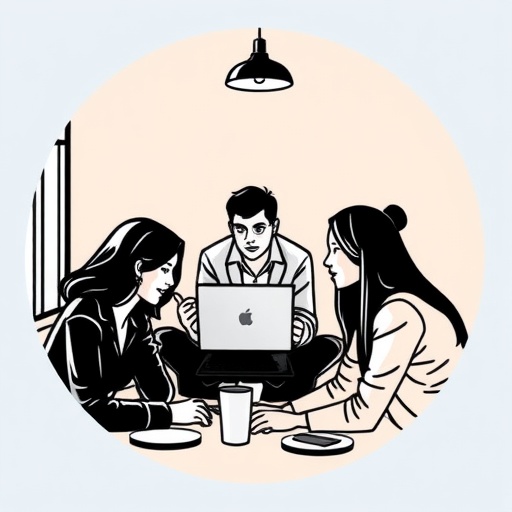Amidst the ongoing transformations in higher education, driven by technological advancements and a shift towards remote learning, a recent qualitative study shines a spotlight on the experiences of master’s students in health sciences engaging in online group work. The research, orchestrated by Edvardsen Tonheim and colleagues, delves into this crucial topic, illuminating the myriad ways in which digital collaboration reshapes learning outcomes, interpersonal dynamics, and professional preparedness in health-related fields. As educational institutions increasingly adopt virtual platforms, understanding the subtleties of online teamwork can serve as a pivotal resource for both educators and students alike.
The study meticulously identifies key themes that emerged from the participants’ narratives during online group work sessions. This qualitative analysis revealed a spectrum of experiences, underscoring the diversity of perspectives held by students navigating this uncharted territory. Many students expressed initial apprehensions about collaborating remotely, spurred by concerns over communication barriers and the potential inequity in participation levels. However, as the research unfolds, it becomes evident that such fears were often mitigated through adaptive strategies and the establishment of clear group norms.
One particularly striking finding of the study is the crucial role that technology plays in facilitating or hindering collaboration among peers. Students shared insights on their reliance on various digital tools—including video conferencing software and collaborative document editing applications—that not only served to foster connectivity but also enhanced the overall learning experience. Interestingly, while some students thrived in the online environment, appreciating the flexibility it afforded, others found the lack of face-to-face interaction challenging. This dichotomy points to the necessity of incorporating diverse learning modes to accommodate varying preferences among students.
As the dialogue around remote education evolves, the study draws attention to the methodologies employed by students during online group work. Techniques such as digital brainstorming sessions and structured feedback loops were highlighted as effective means of engaging all group members, thereby democratizing participation. This adaptability reflects a crucial shift in educational paradigms, indicating that students are not merely passive recipients of knowledge but active contributors to their learning environments. The emphasis on collaborative learning resonates strongly with contemporary pedagogical theories that advocate for learner-centered approaches in education.
Furthermore, the research highlights the impact of social dynamics on group interactions in a virtual context. Participants noted that building rapport among team members took conscious effort in the absence of physical proximity. Virtual icebreakers and informal check-ins emerged as valuable tools for nurturing camaraderie and trust, crucial foundations for successful collaboration. This underscores an essential element of online education: the need to consciously cultivate a sense of community, even in distributed learning environments.
In terms of assessment, the study also raises pertinent questions regarding the evaluation of online group work. Traditional metrics may fall short in measuring the genuine contributions of each participant and the collective learning gained through collaboration. The research advocates for more holistic and formative assessment strategies that consider qualitative feedback and peer evaluations alongside conventional grading systems. This shift in assessment paradigms could lead to a more nuanced understanding of student performance and engagement in online learning settings.
As the coronavirus pandemic served as a catalyst for adopting online education practices, many students found themselves thrust into the world of remote group projects with little preparation. The study’s findings resonate with a wider discourse surrounding the pedagogical challenges posed by abrupt transitions to virtual learning. Such experiences, once fraught with confusion, have the potential to pave the way for more resilient, adaptive learning frameworks as institutions continue to refine their online offerings.
Another vital aspect highlighted by the research is the intersection of digital literacy and collaboration. As students embark on their online group work journeys, the varying levels of comfort with technology became apparent. Some members excelled in leveraging digital tools, while others struggled with the same platforms. This digital divide points to the pressing need for institutions to provide comprehensive training and support for all students, ensuring they not only possess the necessary skills but feel confident in utilizing them.
In addition to enhancing learning experiences, online group work offers a unique platform for developing vital skills relevant to professional practice in health sciences. The study found that many students were able to cultivate competencies in teamwork, problem-solving, and communication—all of which are invaluable in their future careers. By engaging in collaborative projects remotely, students are better equipped to navigate the complexities of real-world healthcare settings where teamwork and effective communication are paramount.
In summary, the qualitative study conducted by Edvardsen Tonheim et al. uncovers rich insights into the realm of online group work among master’s students in health sciences. Their findings emphasize the importance of adaptability, technology use, and community building in creating effective collaborative learning environments. As the landscape of education continues to evolve, the lessons gleaned from these experiences provide crucial guidance for educators and institutions aiming to harness the full potential of online learning and prepare students for the demands of their chosen professions.
Conclusively, as we navigate the future of education, the study serves as a beacon, encouraging a shift towards more inclusive, responsive, and collaborative approaches within both online and traditional educational frameworks. This new era of learning presents an opportunity to reshape how we think about education, equipping learners not only with knowledge but with the collaborative skills essential for success in an interconnected world.
Subject of Research: Experiences with online group work among master’s students in health sciences.
Article Title: Experiences with online group work among master’s students in health sciences: a qualitative study.
Article References:
Edvardsen Tonheim, L., Molin, M., Brevik, A. et al. Experiences with online group work among master’s students in health sciences: a qualitative study.
BMC Med Educ 25, 1262 (2025). https://doi.org/10.1186/s12909-025-07845-w
Image Credits: AI Generated
DOI: 10.1186/s12909-025-07845-w
Keywords: Online education, group collaboration, health sciences, qualitative research, digital learning platforms.




